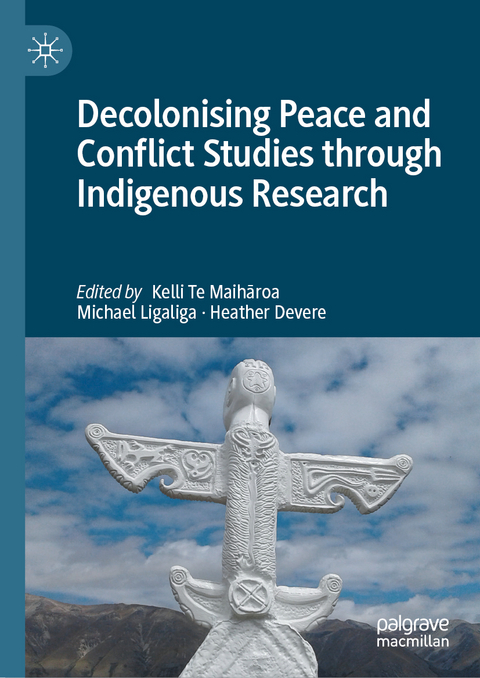
Decolonising Peace and Conflict Studies through Indigenous Research
Palgrave Macmillan (Verlag)
978-981-16-6778-7 (ISBN)
- Titel nicht im Sortiment
- Artikel merken
Dr. Kelli Te Maihāroa (Waitaha, Ngāti Rārua, Te Ātiawa) has held leadership roles at the Otago Polytechnic as Tumuaki: Rakahau Māori / Director of Māori Research and Kaihautū: Te Kāhui Whetū Lead / Capable Māori, working with Iwi Māori throughout Aotearoa, New Zealand. She is an active member within her whānau, Iwi and local Māori community. She is a mokopuna of Te Maihāroa, the last southern Māori prophet and tohuka (expert tribal specialist). Dr. Michael Fusi Ligaliga is a lecturer and researcher in the School of Māori and Pacific Indigenous Studies at the University of Otago in Dunedin, Aotearoa, New Zealand. He teaches Pacific Island issues, indigenous leadership and peace and conflict in the Pacific. He has acted as Interim Director of the David O. McKay Centre for Intercultural Understanding at Brightham Young University Hawai’i. Dr. Heather Devere is Director of Practice at the Te Ao o Rongomaraeroa/The National Centre for Peace and Conflict Studies, University of Otago in Aotearoa, New Zealand. She has written widely on issues related to the politics of friendship, Indigenous peace traditions and peacebuilding, peace journalism, restorative justice, and social justice. She is Secretary of Parihaka Network: Ngā Manu Korihi, involved in community mediation, refugee settlement, human rights, and social justice issues.
Chapter 1: Introduction.- PART 1: Indigenous epistemologies, methodologies and method.- Chapter 2: Decolonising Peacebuilding Research through Indigenous Knowledge Systems: Experience of Igbo Speaking group of Niger-Delta Region, Nigeria.- Chapter 3: Restoring Balance and Harmony to Peace and Conflict Studies: Engaging Indigenous Paradigm Research in Collaborations of Integrity.- Chapter 4: Affirming an Indigenous Approach within Peace and Conflict Studies.- Chapter 5: When an Indigenous Researcher Sees, Speaks and Writes: The Experience of Palestinian Research in Israel.- Chapter 6: Liming and Ole Talk: A Site of Negotiation, Contestation and Relationships.- Chapter 7: Exploring Indigenous Peace Traditions Collaboratively.- PART 2: Peace Education and Indigenous Research.- Chapter 8: Beloved Community: Teacher reflection on Hawaiʻi-based teaching and learning framework, Nā Hopena Aʻo (HĀ), and possible implications for decolonisation in peace studies and peace education.- Chapter 9: The Path of Education in Mexico goes back to its roots.- Chapter 10: Te Ao o Rongomaraeroa: Decolonising Research in a Space for Peace.- PART 3: Indigenous Perspectives on Peace Development and Peace Processes.- Chapter 11: Decolonising the (Indonesian) ‘Peace Concept’ in West-Papua.- Chapter 12: Indigenous Conflict Resolution: A Samoan Perspective.- Chapter 13: Treaty Making (Makarrata) and An ‘Invisible’ People: Seeking a Just Peace after Conflict.- Chapter 14: Appreciative Accompaniment and Storywork in the Philippines: Bridging Peace and Conflict Studies and Indigenous Research.- PART 4: Conclusion.- Chapter 15: Conclusion: From Decolonisation to Ethical Restoration.
| Erscheinungsdatum | 10.03.2022 |
|---|---|
| Zusatzinfo | 2 Illustrations, color; 2 Illustrations, black and white; XVII, 372 p. 4 illus., 2 illus. in color. |
| Verlagsort | Singapore |
| Sprache | englisch |
| Maße | 148 x 210 mm |
| Themenwelt | Geisteswissenschaften ► Philosophie ► Geschichte der Philosophie |
| Geisteswissenschaften ► Philosophie ► Philosophie der Neuzeit | |
| Sozialwissenschaften ► Politik / Verwaltung ► Europäische / Internationale Politik | |
| Sozialwissenschaften ► Politik / Verwaltung ► Vergleichende Politikwissenschaften | |
| Schlagworte | Decolonisation and Peace Studies • Decolonising of (Indonesian) Peace Concept • Decolonising Peacebuilding Research • development and education • Engaging Indigenist Research • healing and reconciliation • Indigenous knowledge • indigenous knowledge systems • indigenous movements • Indigenous Peace • Indigenous peoples • indigenous research methods • indigenous studies • Makarrata • Pacific Lens on Peace and Conflict • Palestinian Research in Israel • Peace and Conflict Studies • peace processes • Transformative Justice Inquiry |
| ISBN-10 | 981-16-6778-0 / 9811667780 |
| ISBN-13 | 978-981-16-6778-7 / 9789811667787 |
| Zustand | Neuware |
| Informationen gemäß Produktsicherheitsverordnung (GPSR) | |
| Haben Sie eine Frage zum Produkt? |
aus dem Bereich


